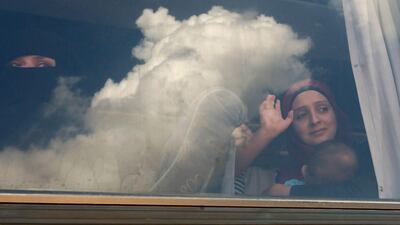Lebanon's ministry of refugee affairs believes at least 20 Syrian refugees who returned to their country have been killed by the Syrian army and allied paramilitary groups in recent months.
Relatives and friends of those who were believed to have been killed by pro-government forces first started submitting reports to the ministry in June, caretaker Minister of State for Refugee Affairs Mouin Merehbi told The National on Sunday. The news comes despite assurances from members of the Lebanese government and the country's powerful General Security agency that the return of refugees was being conducted in a safe manner with coordination of the government in Damascus.
Mr Merehbi, a long-time critic of the Syrian government and its Lebanese ally Hezbollah, suggested the number could be higher but that his team has only been able to corroborate the death of roughly 20.
"As a Lebanese ministry, we do not have the logistical capacity to authenticate and verify most reports," he said. He added that his office has not been in contact with Syrian authorities or any source inside the country. The Lebanese government doesn't officially talk with Damascus although some agencies and departments have maintained contact on specific issues.
The minister said he has no evidence to suggest that the killings are targeted or systematic due to being returnees, but that they underscore the continuing insecurity and lawlessness even in so-called safe government-controlled areas of Syria.
UNHCR and Western governments have warned that it is too early to discuss large-scale returns of refugees to Syria as insecurity may lead to a second wave of displacement. Under international law governing the treatment of refugees, returns must be voluntary, safe and dignified.
Although the Syrian government has reclaimed control over much of the country, central government control remains weak and the wide-spread prevalence of semi-autonomous loyalist militias has hampered efforts to maintain order.
The most recent report, submitted to the ministry of refugee affairs, claims that pro-government forces killed a family of three Syrians, including two young teenage boys, in the Homs countryside last Sunday, Mr Merehbi said.
_______________
Read more:
Syrian military clears men wanted for extra military service
Geir Pedersen: Veteran Norwegian diplomat tasked with ending Syria bloodshed
Istanbul Syria peace offers few solutions to the conflict
_______________
The minister said that the victims had returned from Lebanon some eight months ago and he said it appeared a high-ranking member of the Syrian army was behind the killing. He did not say if the family had returned on their own accord or with the General Security programme.
The incident was also reported in the media on October 30 by Zaman Al Wasel, a media outlet affiliated with the Syrian opposition. The news website reported that sectarian pro-government militias were responsible.
Zamal Al Wasel did not give the exact reason behind the killing. It said the act was motivated by sectarianism and noted that at least five other members of that same family have been arrested by the Syrian government since 2013.
"If the Syrian regime really wants Syrians to come back they should stop killing them when they return home," Mr Merehbi said.
The returns have not been coordinated with UN agencies, although UNHCR has assisted cases of voluntary returns needing to reclaim lost documentation to facilitate their life back in Syria. The Lebanese government officially does not maintain direct links with Damascus outside a few select agencies such as General Security. However, all parties in Lebanon maintain that the nearly 1 million Syrian refugees officially in Lebanon – and government's figure of nearly 1.5 million – should return home soon. The government remains divided over the issue despite a broad agreement that refugees should not stay longterm in Lebanon.
Over the past year, Lebanon's Hezbollah has also run a parallel programme for returns. Caretaker Foreign Minister and head of the Free Patriotic Movement Gebran Bassil says he has also taken steps to organize the return of refugees. However, it is unclear how many, if any, have used these systems to return. They have both undertaken the returns on the basis that much of Syria is safe.
Lebanon's General Security said on Friday that more than 80,000 refugees have returned home from Lebanon since July. They include 7,670 who returned with the help of General Security, while the rest returned without the involvement of the security agency.
The increasing number of returns is also reflected in revised data on the number of Syrian refugees residing in Lebanon. UNHCR on September 30 put the total number of registered Syrian refugees in Lebanon at 952,562, down 23,440 since similar numbers on July 31.
Mr Merehbi on Sunday dismissed General Security's estimate of 80,000 returns, saying that the number was most likely exaggerated with the intention of encouraging Syrians in Lebanon to go back.
He gave his own estimate of 55,000 returns since June, explaining that the figure was compiled from open-source data and media reports.
Mr Merehbi complained that neither his ministry nor UNHCR had accurate figures on returns because General Security has so far failed to routinely update them on repatriation procedures.
"There needs to be coordination between our agencies and there needs to be transparency when it comes to reporting the number of returns," he said. "There is almost no coordination at the moment."
The caretaker minister said that he is not opposed to refugee returns in principle, but said that in order for them to be deemed safe and voluntary, they must be overseen by the UN. He adds that the current model for organising returns will only lead to more Syrian deaths or the return of some Syrians to Lebanon through illegal channels.
______________
Read more:
Syrian refugees in Lebanon alarmed by Russian involvement in planned repatriation
Lebanon and Russia form committee on Syrian refugee repatriation
Russia’s push to return Syrian refugees tests Kremlin soft power

